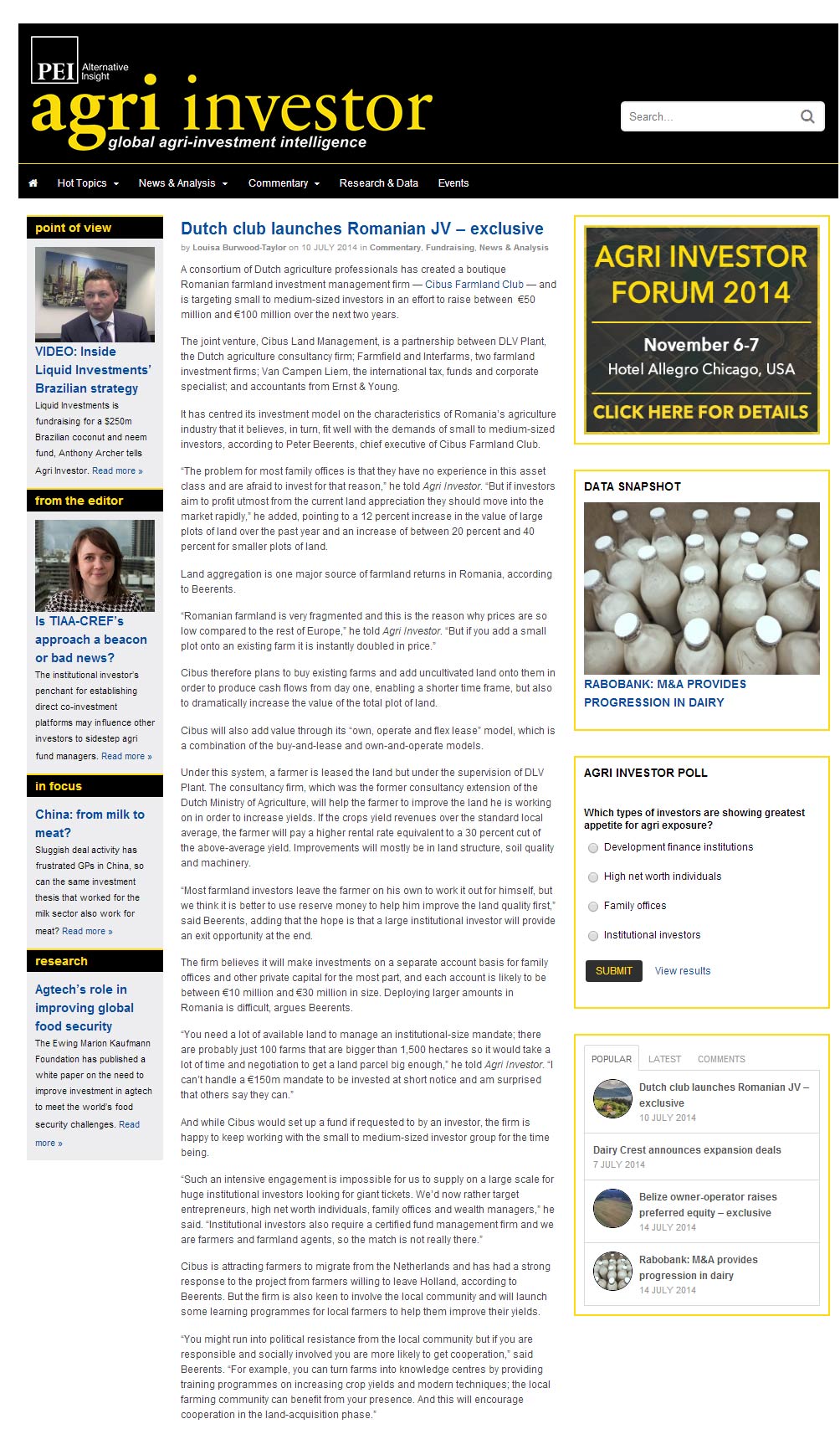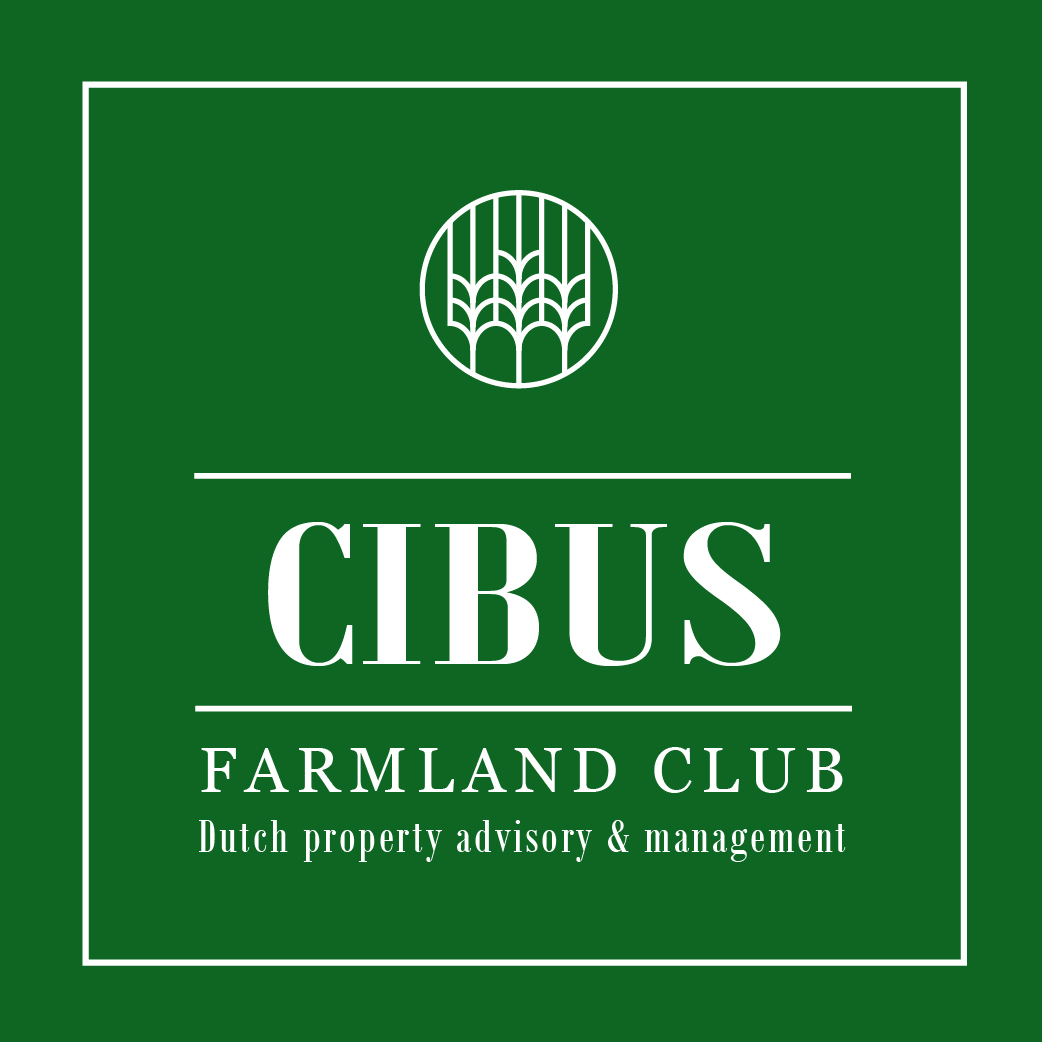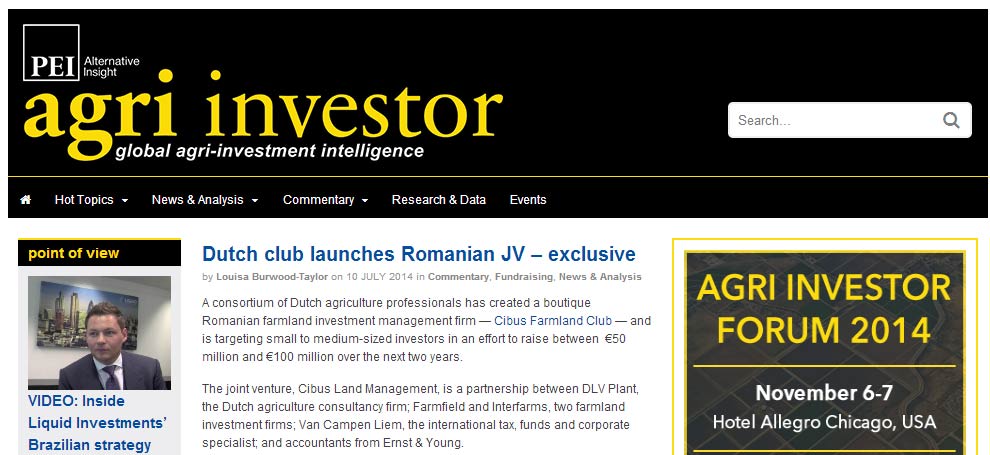Agri Investor
Agri Investor http://www.agriinvestor.com
Louisa Burwood-Taylor
July 10, 2014
Link to article
Dutch farmland club launches Romanian JV
By Louisa Burwood-Taylor on 10 JULY 2014
A consortium of Dutch agriculture professionals has created a boutique Romanian farmland investment management firm Cibus Farmland Club and is targeting small to medium-sized investors in an effort to raise between 50 million and 100 million over the next two years.
It has centred its investment model on the characteristics of Romania’s agriculture industry that it believes, in turn, fit well with the demands of small to medium-sized investors, according to Peter Beerents, chief executive of Cibus Farmland Club.
The problem for most family offices is that they have no experience in this asset class and are afraid to invest for that reason, he told Agri Investor. But if investors aim to profit utmost from the current land appreciation they should move into the market rapidly, he added, pointing to a 12 percent increase in the value of large plots of land over the past year and an increase of between 20 percent and 40 percent for smaller plots of land.
Land aggregation is one major source of farmland returns in Romania, according to Beerents.
Romanian farmland is very fragmented and this is the reason why prices are so low compared to the rest of Europe, he told Agri Investor. But if you add a small plot onto an existing farm it is instantly doubled in price.
Cibus therefore plans to buy existing farms and add uncultivated land onto them in order to produce cash flows from day one, enabling a shorter time frame, but also to dramatically increase the value of the total plot of land.
Cibus will also add value through its own, operate and flex lease model, which is a combination of the buy-and-lease and own-and-operate models.
Under this system, a farmer is leased the land but under the supervision of DLV Plant. The consultancy firm, which was the former consultancy extension of the Dutch Ministry of Agriculture, will help the farmer to improve the land he is working on in order to increase yields. If the crops yield revenues over the standard local average, the farmer will pay a higher rental rate equivalent to a 30 percent cut of the above-average yield. Improvements will mostly be in land structure, soil quality and machinery.
Most farmland investors leave the farmer on his own to work it out for himself, but we think it is better to use reserve money to help him improve the land quality first, said Beerents, adding that the hope is that a large institutional investor will provide an exit opportunity at the end.
The firm believes it will make investments on a separate account basis for family offices and other private capital for the most part, and each account is likely to be between 10 million and 30 million in size. Deploying larger amounts in Romania is difficult, argues Beerents.
You need a lot of available land to manage an institutional-size mandate; there are probably just 100 farms that are bigger than 1,500 hectares so it would take a lot of time and negotiation to get a land parcel big enough, he told Agri Investor. I can’t handle a 150m mandate to be invested at short notice and am surprised that others say they can.
And while Cibus would set up a fund if requested to by an investor, the firm is happy to keep working with the small to medium-sized investor group for the time being.
Such an intensive engagement is impossible for us to supply on a large scale for huge institutional investors looking for giant tickets. We’d now rather target entrepreneurs, high net worth individuals, family offices and wealth managers, he said. Institutional investors also require a certified fund management firm and we are farmers and farmland agents, so the match is not really there.
Cibus is attracting farmers to migrate from the Netherlands and has had a strong response to the project from farmers willing to leave Holland, according to Beerents. But the firm is also keen to involve the local community and will launch some learning programmes for local farmers to help them improve their yields.
You might run into political resistance from the local community but if you are responsible and socially involved you are more likely to get cooperation, said Beerents. For example, you can turn farms into knowledge centres by providing training programmes on increasing crop yields and modern techniques; the local farming community can benefit from your presence. And this will encourage cooperation in the land-acquisition phase.


